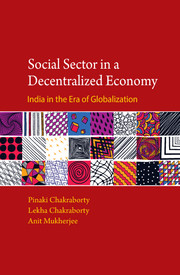Book contents
- Frontmatter
- Contents
- List of Tables, Figures, Boxes and Appendices
- List of Abbreviations
- Preface
- 1 Unpacking Decentralization
- 2 Decentralization in Service Delivery: Empirical Evidences
- 3 Decentralization in India: History, Laws and Politics
- 4 Local-level Fiscal Decentralization: State Finance Commissions and Devolution
- 5 Decentralization of Education
- 6 Decentralization in Health Service Delivery
- 7 Measuring Benefit Incidence: Health and Education
- 8 Effectiveness of Decentralization on Service Delivery: Accountability and Efficiency
- 9 What We Have Learnt and the Way Ahead
- Bibliography
- Index
3 - Decentralization in India: History, Laws and Politics
Published online by Cambridge University Press: 26 September 2017
- Frontmatter
- Contents
- List of Tables, Figures, Boxes and Appendices
- List of Abbreviations
- Preface
- 1 Unpacking Decentralization
- 2 Decentralization in Service Delivery: Empirical Evidences
- 3 Decentralization in India: History, Laws and Politics
- 4 Local-level Fiscal Decentralization: State Finance Commissions and Devolution
- 5 Decentralization of Education
- 6 Decentralization in Health Service Delivery
- 7 Measuring Benefit Incidence: Health and Education
- 8 Effectiveness of Decentralization on Service Delivery: Accountability and Efficiency
- 9 What We Have Learnt and the Way Ahead
- Bibliography
- Index
Summary
In India, the process of decentralization did not necessarily emerge from the demands of effective service delivery. It was mostly a three-pronged approach arising out of the intermingling of various political, social and economic factors. This chapter discusses the history of decentralization, the structures and the legal status, the fundamental processes including the political motivation involved and the outcomes of such a decentralized system on service deliveries in the Indian context. The first section of Chapter 3 contains the historical background of decentralization in India. Its second section discusses the legal status of decentralization in India, while the third section analyzes the enabling conditions for effective service delivery within the decentralized system.
Historical background and political motivation of decentralization in India
In India, the process of decentralization was conceptualized long back since the pre-independence era. The Constitution of India provided for Village Panchayats in the Directive Principles of the Constitution. Article 40 of the Constitution provided with the following that, ‘the State shall take steps to organize village panchayats and endow them with such power and authority as may be necessary to enable them to function as units of self-government.’ Although many state governments attempted to translate this Directive Principle into practice by enacting necessary legislation and creating Panchayati Raj Institutions (PRIs), but with limited success. Against this background, the need for providing a firm Constitutional status for PRIs became necessary.
The First Five Year Plan
The initial efforts at outlining decentralized planning of development commenced with the First Five Year Plan (1951–56), which recognized the need to break up the planning exercise into national, state, district and local community levels, but did not spell out how this was to be operationalized. In January 1957, therefore, a Committee under the chairmanship of Balwant Rai Mehta was formed by the National Development Council to enable the Government of India to spell out and frame the structure of the local self-governments.
- Type
- Chapter
- Information
- Social Sector in a Decentralized EconomyIndia in the Era of Globalization, pp. 24 - 44Publisher: Cambridge University PressPrint publication year: 2016
- Creative Commons
- This content is Open Access and distributed under the terms of the Creative Commons Attribution licence CC-BY-NC-ND 3.0 IGO https://creativecommons.org/cclicenses/



